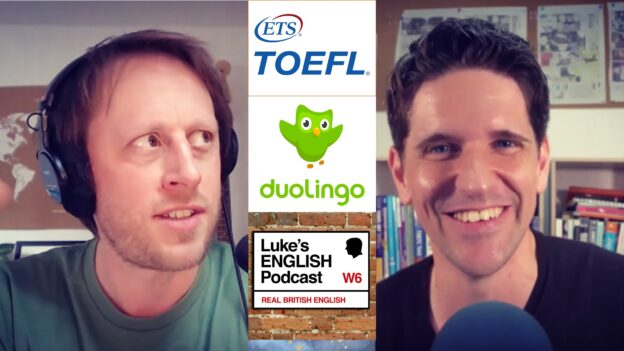An episode full of advice for those taking the IELTS test. [Download]

Transcript
Hello and welcome to Luke’s English Podcast and this exciting and edgy new episode. I hope you are ready physically, mentally, spiritually, because this is going to be epic. I’m attempting to make this sound slightly more dramatic than it actually is. This one is all about the IELTS test, which is not normally an exciting subject, but with the use of this background music and my tone of voice hopefully I can convince you that this really is edge-of-your-seat stuff. If that isn’t enough, and you still need to be convinced of the dramatic tension at the heart of this episode, to keep you fully engaged, I am also expecting a delivery from the post office at any moment. A few days ago I ordered a pair of trainers online – a fresh pair of old-school addidas sneakers, and at some point this morning I expect them to be delivered to my door, by the postman. There could be a buzz at my doorbell at literally any second. I can hardly contain myself, and I hope it’s the same story for you. This is a truly riveting and adrenaline fuelled experience for me, and I hope it is for you too. And it is in this highly tense and gripping context that I bring this episode of LEP to you right now. Now if we can just keep up this level of focus throughout the rest of the episode, that would be great. If it helps you to concentrate, imagine that at any moment my addidas trainers could be delivered. I may even open the package live while recording the podcast. Will they be the right size? Will they be the right colour? Will they suit me? Only time can tell! But one thing’s for sure, it doesn’t get more dramatic than this, as the tension rises ahead of this groundbreaking new episode of Luke’s English Podcast in which we deal with the almost frighteningly engaging subject of the IELTS test, a test which, if you fail it, the penalty is instant death.
Just kidding. It’s not instant death. Usually you have to wait about 3 working days.
Obviously I’m just joking – you don’t die if you fail the IELTS test, and anyway, you can’t fail IELTS. So, that was just a light-hearted introduction to this episode, to make it exciting – because I’m a bit worried that a whole episode about IELTS may be a bit dull – but then again, I’m sure that loads of you out there will find this extremely useful. So let’s get on with it.
Introduction
In this one I’m going to go through all parts of the IELTS test, giving you some tips and general advice. I’m recording this because it is one of the most commonly requested episodes. People are always asking me to do episodes about IELTS and I have never done one until now. So here it is, the eagerly awaited IELTS episode. Loads of people around the world take the IELTS test to get a grade of their English. More and more it is becoming the world’s #1 test of English level. It is a notoriously tough test which challenges many people around the world every day, so what wisdom can I impart to my loyal LEPsters who are hoping to prove themselves in the IELTS challenge? Well, quite a lot I hope.
If you’ve never taken the test, and never plan to (quite a wise move), hopefully there will still be plenty to gain from this episode because advice for the test often works as pretty good advice for study skills in general, and I will be talking throughout the episode about linguistic skills, challenges and advice – so there is bound to be loads of useful language which you can pick up by listening to this, and yes – because I had to prepare this episode in advance, pretty much all of this is transcribed and available for you at teacherluke.co.uk. Just find the page for this episode and away you go!
The IELTS test is administered by Cambridge University and is the UK standard test of English language level. It is used by academic institutions and employers as a way of gauging the English level of potential students or employees. It’s an infamously difficult and is a complete test of your English skills. Many people have to take it before making progress in their career, their studies or just in their life in general, others take it as a challenge or a way to find out their real level in English. In this episode I’m going to impart as much advice as I can for those who are planning to take the test. It is a complex and broad-ranging test and I would need a whole series of episodes to deal with it fully. Here I’m going to give you as many hints and tips for each part of the exam as possible in just one single episode of the podcast. Many of the tips I give here can also be applied to other Cambridge exams like FCE, CAE and BEC as Cambridge tends to use certain question types and techniques across all those tests, although the test formats and levels of challenge are different.
To be completely honest, I wouldn’t normally have done this episode because it requires quite careful preparation, a lot of this advice is quite valuable and I’m a bit reluctant to give it away for nothing, and some people may find it a little dull. That’s why I wouldn’t normally have done this episode, but I am doing it simply because so many people have requested it, and I know that there are some people out there who have no access to affordable resources for IELTS preparation.
People normally pay for this kind of advice for the IELTS test, but I’m willing to give it to you here for nothing. In return please consider making a donation to me if you can. I’ve had to spend quite a lot of time preparing this episode, it includes some wisdom that I’ve developed after years of teaching IELTS classes off and on, and I’ve done it out of generosity and as a favour to many of my listeners who have requested this information. I am not in the business of giving away all my advice and counsel free of charge, as I’m sure you can understand. So, if you find my advice useful, please consider making a contribution by clicking the PayPal button which you will find on the page, and then making a donation. You can choose the amount. The most common amounts are 5-10 pounds but you can give as much or as little as you like. 
Where did I get this info?
A lot of this stuff comes from my own head and my experience of leading students through IELTS preparation, but I haven’t taught IELTS in a while, so I asked my British Council colleagues for their advice, and I looked at some BC published material which also includes lots of good tips.
By the way – I get quite a lot of teachers listening to this, as well as great students who have good IELTS scores. I’m sure you’ve got some great insights and tips as well. Please share them in the comments section. Certainly, if something occurs to you that I have missed, just add it in the comments section.
Download this useful stuff
If you’re serious about taking IELTS you will need study materials. You can buy preparation books from Cambridge University Press, and you should also consider getting one of their books of practice tests too.
Here are some other useful things for you to download:
The IELTS teacher’s guide – contains an overview of the test, explanation of the levels, assessment criteria for the speaking and writing sections (very valuable) http://www.ielts.org/PDF/Guide_Teachers_2013.pdf
IELTS test samples – http://www.ielts.org/test_takers_information/test_sample.aspx This is invaluable because you can see the real tasks you have to do. Particularly useful are the sample writing tasks and answers. You can see the tasks, then read some answers from candidates, and then read the assessment feedback by examiners. I find this to be one of the best ways to get my students to reflect on what makes a good piece of writing. Click here to go straight to the writing part, and the sample answers are the last item in this list https://www.ielts.org/test_takers_information/test_sample/academic_writing_sample.aspx
What is IELTS?
IELTS stands for the International English Language Testing System. It is developed and administered by Cambridge University, The British Council and IDP Australia. The main point of the test is to determine language level. It is impossible to pass or fail the test. Instead, you are given scores for your reading, writing, listening and speaking skills and a global mark which is an average of all the other scores.
It’s a difficult test and everyone finds it challenging. Even native speakers have problems with this test and it is very very rare to get 100%.
The score you get from the test is a reflection of your English level. Many people use IELTS levels as a standard for talking about language level. 1 – 9.
There are two types of IELTS test – the general exam and the academic exam. The format is very similar between the two, in fact the listening and speaking sections are the same. For the academic test in the reading and writing sections the topics are more academic, and you have to write a description of a diagram. The academic one is more popular and I have only ever taught that one, so that’s what I’m focusing on.
Universities and employers will often require you to have a certain score (e.g. minimum level 7) to gain access to a course or a job. Many people around the world are attempting to take the IELTS challenge – usually to prove their level of English as part of a university or job application, or just because they are masochists who like to make their own lives difficult!
The American equivalent is TOEFL, which is a completely different test.
IELTS has a task-based approach, and tests you on what you can do in English rather than what you know. For example, there are no grammar gap-fills. Instead your grammar is tested by your ability to achieve tasks in the written and spoken parts of the test. So, basically, you have to do certain tasks in all parts of the test – understand the general or specific meanings of some texts, be able to follow lectures and conversations, write several types of text, and speak about different things on your own or in a dialogue with someone else.
The listening, reading and writing parts happen in the same session. The speaking test is done at a different time but often on the same day.
The whole test lasts just under 3 hours.
General Advice
Before you take this exam you must be prepared. Do not walk into the exam without having at least tried a few practice tests before. You need to be familiar with the format of the test so that it is not all new to you. It’s q complex test. To a large extent, taking an IELTS course will train you on how to deal with the test itself as much as give you English training. So, you need to know the test before you start. Practice tests can be found online.
Know the assessment criteria. You need to know what the examiners are looking for, especially in the writing and speaking parts. Assessment criteria can be found online at the Cambridge IELTS website too.
Do some practice. Do each part of the test a few times separately, and do a whole test in exam conditions at least once before you do it for real. This will help you practice concentrating for a long time, and it will help you learn about timing, and your strengths and weaknesses. Real test practice is vital.
Time yourself when doing exercises. You should always be aware of how much time you have to do each part of the test, and you should know how much time it takes you to do each part.
Get yourself properly ready on the day and do what you can to remove problems so that you are calm and in a good mood. Get a good night’s sleep before the exam! Eat a proper breakfast. Know the route to the test centre. Make the journey before you do it for real so you know how to get there. You don’t want any unnecessary stress, because the day may be pretty stressful.
When you’re practising, stay positive! Remember that this is a difficult test and everyone struggles with it, even native speakers.
Set yourself a goal – aim for a certain percentage (e.g. 70%) for each section.
When you check your answers, learn from your mistakes. Where do you lose points? What do you need to do to fix that?
Maximise your English input generally. Listen to lots of authentic English, or podcasts like LEP. Read a lot of magazine and newspaper articles. Fairly long magazine articles are best. They’re quite similar to IELTS reading texts.
Read some reports on data – anything with a graph, diagram or table and accompanying report. This will help you with writing part 1.
Keep an organised record of vocabulary. Write new words in a notebook, and write whatever you need to remember those words. Add examples to your notes, that’s important, but also add mnemonic notes – just any associations that will help you remember them. They could be vivid images, or connections to things you already remember. For example if you want to remember the word ‘plunge’ – you could connect it to an existing word in your language (plonger for example) or perhaps the sound of something dropping into water from a height. Add anything to help you remember the word. Test yourself using your word list regularly. Cover the word, make example sentences, check the pronunciation in a dictionary etc.
Attending an IELTS preparation course is always a good idea – it will almost certainly help you, but you must remember that you are the only one who is responsible for your success in this test. Even if you have a teacher or a tutor – it comes down to you. The effort, concentration and time you put into it will pay off later. Take responsibility for your own progress.
Don’t forget the 7 Ps: Practice, practice, practice, practice, practice, practice, practice.
You’ll probably need to get hold of practice test materials – published books or stuff online that you can find.
Reading Paper
Don’t read the entire text from start to finish before dealing with questions. You don’t have time and it’s unnecessary. Instead, use the questions as a guide and then skim or scan the text to find the relevant answers.
Use the title; introduction and final paragraph to get a general gist of the text to help give you context.
You don’t get transfer time in this section, so make sure you add your answers to the answer sheet properly as you go.
Don’t bother marking your answers temporarily in pencil before finalising them later. Just add your final answer there and then. You won’t have time to come back and confirm later.
You get 60 minutes. If you finish way too early, there’s something wrong. If you struggle to complete in time, there’s something wrong too! Ideally it will take you exactly 60 minutes to complete the test.
Don’t get stuck on one question and dwell on it for a long time. Move on to the next question and come back to it later if you have time. Sometimes people with very good reading skills will lose lots of points because they let one or two questions ruin the rest of the test.
Do not panic! It’s never that bad. Stay positive throughout the test, even if you feel like you’re not doing very well. The test is not designed to make you feel like you’re doing well. It is not supposed to be pleasant and rewarding, so it probably won’t be. Just pick the answer you think is right and move on. Sometimes you’ll need to choose the ‘least bad’ option. Sometimes it will be a question of cancelling out the wrong answers until you are left with just one.
The reading test often tricks you with distractors. You may find many synonyms in the text, but be sure that they are the right answer. Expect distractors and tricks and notice them when you see them.
Synonyms and paraphrasing are often used. Watch out for words or phrases with a similar meaning.
Watch out for reference words – especially when you’re adding sentences into paragraphs. This kind of task tests your understanding of text cohesion. There are lots of words in English that refer to other parts of a text – words before and after. These are words like ‘this, these, that, those, it’ and other devices that allow the writer to repeat him or herself by using different words. Watch out for reference words and identify which other words they refer to.
Like in the listening section, look at the gaps you have to complete and use your knowledge of grammar to predict what kind of word is needed.
Imagine you are a ‘text detective’ looking for clues. It’s more fun that way.
Read in a clever way. Skim for general understanding. Scan for specific info.
Hold the question/sentence in mind while reading the text. You have to multi task a lot. You should be constantly going from question to text, keeping the question in mind while searching for the relevant section of the text with the answer.
Use a highlighter pen to highlight key words in the questions and in the text.
Use a pen to break up the text to help you navigate it.
Remember – the answers must come only from the text, not from your knowledge or deductive reasoning. It’s just based on what is written in the text, even if you disagree with the information or know better. It’s a reading test not a general knowledge quiz.
If a text is on a topic you don’t know, it doesn’t matter. You do not need to be an expert on the subject. It’s all just about language, and no specific terminology or jargon is used in the test.
True/False/Not given is probably the hardest section. Remember: Does the text directly contradict the sentence? If ‘yes’ then it is false. If the text does not specifically deal with the point in the sentence either way, it’s not given.
If you’re guessing the answers in the true/false/NG section, don’t choose NG because it is the least frequent answer.
If you don’t know a word you can pretty often just guess what it means from the context. You’d be surprised at how accurate my students guesses are when I ask them to guess from context. Is the word positive or negative? What kind of word is it? Make an educated guess based on the context of the word – you’ll be closer than you think.
Tolerate a bit of ambiguity and some level of confusion. It’s normal to be confused and you will often be out of your comfort zone. Learn to operate in that place. For practice you should be reading magazine articles that are difficult. You’re not reading for pleasure here, you’re reading to practice reading in adverse circumstances in which you’re guessing what a lot of it means, tolerating not understanding some things, filling the blanks in your head, and doing it all in about 20 minutes.
Texts are often divided into sections. These could be dates, or types of thing, or people. Highlight these so you can navigate the text easily. For example, it could be a scientific article about key discoveries. The text could deal with each discovery one by one. You can then divide the text into sections that deal with each discovery. This will help you scan for specific details.
You can write all over the question paper if you want to.
You need to do loads of reading practice. Read – every – day. Pick magazines or websites that are not too specific. For example, not financial papers or fashion magazines, but magazines that have articles on lots of subjects. Articles should be quite long.
Yes, it is a long test, which confirms to me that episodes of LEP should also be long. I’m convinced that it’s good to practice long-term listening – that means listening for longer periods, but also listening long-term in your life. Regular listening to extended periods, is bound to have a great effect on your English! If you are a regular LEPPER then you’re already at an advantage. Remember that when you’re taking the test. Look at the other candidates and think “Poor them, they don’ listen to LEP. What chance can they possibly have?”
Listening Paper
Usually you have to complete some notes or sentences based on conversations or lectures.
Make sure you know what kind of thing you’re going to hear. Be prepared. Look at the notes you have to complete to get an overall idea of the challenge you face.
Make sure you’ve seen all the gaps and notes you have to complete so you don’t miss anything.
Predict the answers. Use bits of time to look at the questions and predict what kind of thing you’re going to hear. Look at gaps and predict what kind of info goes in each gap – is it a noun, a verb, a number, a date, a name. Maybe you can predict the answers yourself.
Scribble notes on the exam paper.
Sometimes later questions will give you clues about earlier answers, but be careful of jumping ahead or backwards too much. You need to stay with the flow of the listening and follow it in the notes you’re completing.
Don’t get left behind. Keep up with the recording.
If you don’t know an answer don’t get stuck. Move on to the next one and don’t lose the recording! You can use the notes to make sure you are synchronised between listening to the recording and reading the notes. Make sure you are at the right place in the notes.
Again, if you miss an answer just forget it and move on. Don’t let one bad question ruin all the others. Keeping up with the recording is vital.
Pay attention to what is written around the gap you’re expecting. You may find that words in the notes after the gap will help you get the answer. I mean, the recording may refer to some words that follow the gap you’re looking at, and a couple of gaps may be covered by just one sentence in the recording. So be aware of the general context around the gap you’re looking at.
Remember that the answers are based on the content of the listening only. You might know the answer from your general knowledge, but it is vital that you give the answer that is given in the listening.
Watch out for distractors and tricks which are designed to fool you. Listen carefully at all times and be sure your answer is right!
Use your knowledge of grammar to help you predict answers. For example, does the gap contain a noun, verb or whatever, and is it in plural form or third person or whatever?
Pay attention when completing your answer sheet. Make sure you’re doing it correctly. People sometimes switch off when doing this but one simple mistake can make all the answers wrong.
Never leave a blank space on the answer sheet in a multiple choice situation. Put something, and then you’ve got a 25% chance of a right answer.
Remember that you will probably not hear the same words in the recording as you can see written in the sentences you are completing, so you must always be on the lookout for synonyms – different ways of saying the same thing. This is really important in IELTS. It’s all about synonyms – at a lexical and grammatical level.
“He wants to get on but he doesn’t have enough money to pay for university.”
On the answer sheet you might see:
“He wants to advance.”
“Get on” and “advance” are synonymous. When you are thinking of what key words to listen for, think of synonyms you might hear along with the word used in the question.
Watch out for paraphrasing (like the previous point) e.g. “Less than a quarter of university students took part.”
On the answer sheet you might see:
“Only 23% of candidates actually sat the examination.”
Get used to listening to numbers in English, like the difference between 13 and 30 etc (expand on this in the podcast)
Watch out for spelling and punctuation – especially capitalisation of names and places. If in doubt, write everything in capital letters because you won’t be penalised for it, but you are penalised for failing to write a capital where appropriate.
Listen a lot!
There are tests available online, but you could make your own tests. You could copy +paste an LEP transcript into a word doc, then gap a bunch of random words, then listen and fill the gaps – but there will be no disparity between the notes and the listening. Alternatively, surf the web for IELTS listening practice exercises.
There are no short cuts – just practice and positivity.
Writing Paper
Overview – you have 1 hour to do 2 tasks. You should spend about 20 mins on part 1 a nd 40 mins on part 2. The second part gives you more points and requires more time to do properly.
Time is the big challenge here.
Practise doing writing papers again and again if you can. Practice is vital if you want to do your best. You must get used to the timing, the task types, concentrating for a long time, and dealing with the visual data in part 1.
You also need to practice part 2 in order to get used to organising your ideas into paragraphs and developing your ideas.
Remember, what I’m giving you now is an overview, as I can’t go into massive amounts of depth. To be honest though, the best thing you can do is practice a lot.
– – – – –
It also helps if you can have access to the marking criteria for the writing and speaking parts. This does contain some jargon, but it is very helpful to know what the examiners are thinking while reading your work, and exactly how your English is being judged. I must try and add in some details about the marking criteria.
Make sure you read the instructions for the task really carefully – make sure you know exactly what you are expected to write. Don’t make a stupid mistake and write about the wrong thing. Always read the instructions carefully.
Don’t write in note form or bullet points in either essay. You should write full sentences and paragraphs.
Don’t memorise a standard model answer that you can just repeat during the exam. This just won’t work because the data will be different.
Always check your writing for little errors when you’ve finished. Proofread, every time. It can save you some points.
Useful Links
Check this link because it will give you sample writing tasks, and sample answers with examiner’s feedback. It’s very useful indeed because you can see what the examiners are looking for. https://www.ielts.org/test_takers_information/test_sample/academic_writing_sample.aspx
Part 1
You’ll be given some visual data, and you have 150 words to summarise it. Imagine you’re writing a summary for your teacher.
It always helps to imagine you are writing for a real person – either the teacher, as it says in the task, or just the examiner who is probably a middle-aged man or woman who has a massive pile of exam papers on his/her desk – he/she has seen hundreds of these papers before. So, first impressions do count – try to write neatly, make sure you leave clear spaces between paragraphs, spell correctly, use the right punctuation and capitalisation, make sure your margins are straight. Make your writing look nice! Also, considering your reader can help you to create better writing which is more readable, pleasant and engaging. In fact, ‘effect on the reader’ is one of the criteria used by Cambridge. Good effect on the reader means that the reader has quite a pleasant experience with your writing – it’s clear, it’s a smooth reading experience, it’s coherant, it doesn’t require lots of effort to understand and the style is appropriate.
By the way, the style for your IELTS writing is quite formal. Formal to neutral. That means – no contractions, it’s not overly familiar like an email to a friend. Put it in the kind of style that would be appropriate for a potential business partner, or an older teacher, or a superior in your company.
So, you have to summarise some visual data. it could be a table, it could be a line graph, a bar chart, a pie chart or even a diagram for a process. There’s also a title and a short explanation of the diagram.
Study the diagram carefully and make sure you understand basically what it represents. Take some time to understand it, because this is a really important stage. if you don’t understand the data, your writing will stink! Study each axis on a graph, make sure you know what the factors are in the data. Make a note of the main trends in the data too. You can’t explain absolutely everything, so you need to find the most significant aspects of the data and then explain that.
You may want to use a highlighter pen to highlight the key words in the task and data.
How many paragraphs? about 2. A quick introduction and then a description of the data. No need for a conclusion.
You’ll need linking phrases for addition and contrast – particularly for contrast as this often involves explaining two sets of data, including their similarities and significant differences.
You will probably need the language of trends – that’s verbs and nouns like climb, rise, shoot up, drop, plunge, level out etc.
You can find examples of linking language and trends language for IELTS by clicking this link http://juliaenglishinmanchester.blogspot.fr/2012/05/useful-language-for-ielts-writing-task.html and this link http://www.ieltstips.com/ielts/ielts_writing_test/task_1:_how_to_use_linking_phrases_effectively_-_answer_key.html and just by doing google searches for “IELTS part 1 writing useful language linking trends”
In the introduction you can paraphrase the description given in the task. Do not copy phrases from the diagram or task instructions. You must paraphrase every time. In your intro, just explain what the diagram is about.
Then in the next paragraph, explain the data so that the reader can copy the graph without seeing it. If the data is complex, just focus on the most significant details.
You don’t have to explain why – just describe what you see.
Plan your writing quickly in advance by noting the basic points you will make.
You should never start writing without planning, even in a simple way, what you’re going to write.
20 minutes.
Stick to the word count of 150 words. This should be possible if you’re explaining the main points with the right level of detail.
Again, doing lots of reading can help you a lot. Try reading magazines or newspapers which have diagrams and graphs and things. Scientific magazines, things like that.
Part 2
As always – READ THE INSTRUCTIONS CAREFULLY AND UNDERSTAND THE QUESTION!
Sorry for shouting, but students commonly lose points by not answering the question. One of the assessment criteria is task achievement. You have to do what the task tells you to do.
In part 2 you have to write a short discursive essay in response to a statement or question. For example, you may be asked to write about whether you agree or disagree with something, or to consider arguments related to an issue. it could be the environment, or reducing crime, or the effect of video games on kids.
Again, plan your answer. Spend a bit of time thinking about the question, making sure you definitely understand what you have to do, consider your points and how you will develop them.
You’ll probably write about 4 paragraphs.
The examiner is checking for these things: Did the person complete the task? Did the candidate explain whether they agree or disagree with the subject, developing their points clearly? Is the writing clearly structured and coherent? Is there a wide range of vocabulary and grammar, used accurately? Are the words spelled correctly?
The answers to all those questions should be “yes”.
Remember to show the examiner what you can do – use a good range of language, don’t repeat yourself too much, don’t just use simple words like ‘good’, ‘bad’ or ‘nice’.
By the way, it’s not all about idioms – they are just a part of the vocabulary that we use. Don’t feel the need to write in idioms only because that can come across as unnecessary and even unclear. Be clear, be specific, be understandable. Achieving the task is your first goal, not showing off your English (but you should show off a little bit).
Once you’ve properly understood the subject you’re going to write about, carefully consider your point of view. Try to come up with several clear arguments on both sides. restrict yourself to one or two points on each side of the argument. Add one or two points to each paragraph, and make sure the points are clearly and logically developed. Do not add new points randomly at the end of paragraphs or with no development.
Don’t write anything without planning first. Choose the points you will state and develop, and make a little plan. You can write on the exam paper. Sketch a plan with notes on how you can develop your idea. You can follow the plan when you write. Don’t try to plan and write at the same time because it results in incoherent writing.
Paragraph 1: Introduction: Do not copy anything from the task. Use your own words to explain the topic of the essay. Keep it simple. Explain the issue and then how you are going to deal with it.
Main body of the essay: You could either cover both sides of the argument in a balanced way or just argue in favour of one side. Personally, I prefer the first one, and if you take the second option you’ll probably have to mention the other side of the argument anyway, so let’s choose the contrastive approach – contrasting both sides of the argument.
So, paragraph 2 (two arguments for) – start with a topic sentence. This summarises your point of view. (note to Luke: come up with an example) then develop that point over the next couple of sentences. Go deeper. Tell us why this is a point for or against. Go further into the issue. See the bigger picture. You could use an example. Remember you don’t have many words, so just use a couple of sentences to develop your point.
Then add your second point for. Topic sentence, development. You may need to use a linking word for addition here, like in addition.
Make sure all these ideas are logically linked.
Paragraph 3: Arguments against. Again, begin with a topic sentence before developing the idea. You’ll probably have to use a linking word for contrast, like However, which usually goes at the beginning of a sentence. Sorry, I can’t go into all the details of specific linking words and stuff like that in this episode. No time.
Then you finish it all off with your conclusion in which you give an overall summary of what you’ve stated already. Remember to answer the question in the task. That’s a good way to focus your attention. Just directly answer the question – do you agree or not. You could use a phrase like ‘on balance’.
So, that’s pretty much it for the writing. Don’t forget to click the links and get that useful stuff from the IELTS website. That’ll help you a lot.
If you’re not taking the IELTS test, you can just feel very relieved and happy.
Speaking Test
So, the speaking part is in 3 sections and lasts about 11-14 minutes.
Part 1 (about 5 mins)
The examiner introduces him/herself and asks you to introduce yourself. Here you don’t need to go into massive detail about where you are from, but it’s good to add a bit of extra info. “E.g. I’m Luke and I come from Birmingham, which is a big city in the centre of England”
The examiner will then ask you some general questions on familiar topics. Just relax and be sociable. Answer the questions and give some extra information. Do not give too little – this is your time to shine!
The worst thing you can do is be silent.
Don’t worry about errors – fluency, and communicative competence are more important. Make an effort to engage with the examiner, and yes, use a bit of charm! It’s a natural conversation. Enjoy it a bit too ;)
This is not too tricky. Just be yourself, warm up, don’t be too quiet, don’t talk too much.
Part 2 (about 4 mins)
Describe something you own which is very important to you.
You should say:
where you got it from
how long you have had it
what you use it for
and explain why it is important to you.
The examiner gives you a card with a topic and some ideas and you have to talk about if for about 2 minutes.
You get some time to prepare, so it’s a good idea to plan your talk, and make a couple of notes.
Try to illustrate your points with examples. This is really important and helps to bring your speech to life.
Have a little introduction – maybe one sentence which just introduces your talk “I’d like to tell you about my laptop, because it is something that I couldn’t live without”.
Then go through the points, adding any details you noted before.
Close the speech if possible, by saying one line.
The examiner will then ask you a couple of other questions based on your topic for part 2, before going on to part 3.
Part 3
This lasts about 5 minutes and involves the examiner asking you discussion questions based on the topic of part 3.
Whereas part 1 was a nice little chat about familiar things, part 3 is more challenging because you’re expected to talk about more abstract topics. This is your chance to show your ability to engage in a discussion, agreeing, disagreeing, giving opinions, showing off your range of grammar and vocab. Again, don’t worry about accuracy the whole time. Being understandable, getting your points across, and being able to achieve the task are far more important. If you’re worried about being correct, or even forcing in some idioms or specific vocabulary you won’t be thinking about the task at hand – expressing your opinion and discussing the questions. Don’t forget the importance of communicative interaction and task achievement.
Of course, remember the 7 Ps: Practice, practice, practice, practice, practice, practice, practice.
Find a partner and discuss some topics. Use IELTS Speaking Part 3 samples which you can find by googling just that.
Try recording yourself, if you can bear it.
Just get used to responding quickly, giving examples, speaking from personal experience. The more you practice, the easier it will be in the real test. It should be like second nature. You should go into the exam room feeling ready, feeling like you’ve done this shit loads of times before.
The golden rule: stay cool fool! You gots to chill!
EPMD – You Gots to Chill (Click here for the lyrics)
So that’s the end of my IELTS episode. BYE!









